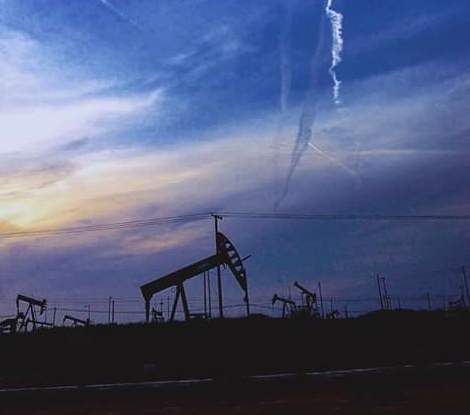Photo by Jerry Mathes II
The Monitoring Team: Aaron Wood, Henrik Vorloeper
Doha meeting turns out to be a farce already
The high expectations set on the meeting between two major oil producing countries Saudi-Arabia and Russia to take place in April 2017 has already razed all hopes for those who have an interest in an oil production freeze – mainly smaller producers, who are hit hardest by low prices of oil. Amongst them, however, are Venezuela and Nigeria. But they are going to be disappointed according to the analysis from oilprice.com. For Russia, the oil production freeze is likely not being significant, since the country at the moment produces on the highest level since Soviet times. What matters is Saudi Arabia and Iran. Saudi Arabia stated clearly it would freeze production, if all countries decide to freeze production as well. Iran announced that it would increase production, consequently reaping the benefits of lifted sanctions. If Saudi Arabia adheres to its warnings, the output freeze is unlikely to happen.
Rakesh Upadhyay, 2016. Are The Saudis And Russians Deliberately Sabotaging Doha? Oilprice.com, 06 April 2016. http://oilprice.com/Energy/Energy-General/Are-The-Saudis-And-Russians-Deliberately-Sabotaging-Doha.html
Russia is serious about Urals as a global benchmark
Trading of the Urals oil export futures will commence end of 2016 and oil is expected to cost more than with the currently recognized Brent price. One prerequisite is that oil output in Russia remains at a high level, although Urals production almost doubles production of Brent oil. The problem is that Urals is currently traded outside exchanges and mostly by long-term contracts. Thus only contract partners know the real price of Urals. Further, Urals oil quality differs greatly from Brent. If Urals will become a benchmark, the price will be transparent, but more importantly according to analysts, it will be fair. St. Petersburg International Mercantile Exchange, or SPIMEX, will then be the exchange on which Ural futures are traded. Delivery via the ports of Primorsk, Novorossiysk and Ust-Luga and the pipeline Druzhba justifies Urals to be a globally traded commodity, however, the local market development will influence the process. U.S. Dollar will be used for trade, transition to Rubles depends on the political situation. ESPO brand could be the next global benchmark, provided that Asian markets are growing. The port Kozmino would become main delivery point for global markets.
Donald Levit, 2016. Economic Calendar. Will Russian Urals Overtake Brent As The World’s Oil Benchmark? Platt.com, 06 April 2016. http://oilprice.com/Energy/Crude-Oil/Will-Russian-Urals-Overtake-Brent-As-The-Worlds-Oil-Benchmark.html
Angola asks IMF for help
Angola requested a loan from IMF of about USD 1.5bln as a consequence of low oil prices. The IMF said it will discuss the bid, but according to fund rules, Angola is eligible for USD 500mln only per year, unless a special waiver is made. Last time Angola asked the IMF for a loan was in 2009 for a similar sum, but still repays on it. The move indicates the stresses put on oil producers especially in Africa in a result of falling oil prices. Angola is not the only country asking global lenders for help, but it is another one that following the same trend. Interestingly though is that Angola is the first developing world country that turns to IMF rather than World Bank. World Bank is known to require lower conditions of economic reform within the country. However, Angola has already a loan from World Bank. That only means, according to the analysis that things have gone worse in Angola. The IMF package for Angola is likely to be tougher than in 2009, although Luanda claims to work according to its commitments. Angola needs external funding this year of about USD 8bln. Equally interesting is that Angola has not turned more towards China, despite Beijing being another big spender in Africa.
Shawn Donnan, Washington, 2016. Angola turns to IMF for bailout amid oil price fallout. Financial Times.com, 06 April 2016. http://www.ft.com/cms/s/0/732e5b5a-fc24-11e5-a31a-7930bacb3f5f.html#axzz457Nz6lts
South Stream not yet off the table
When Russia abruptly cancelled its gas-pipeline project South Stream, many countries in Southern Europe and the Balkans felt left alone, betrayed and searching for new alternatives. Bulgaria decided for a strategy to push Russia further and thus not giving up. The reasons behind Bulgaria’s strategy are as such. First, Bulgaria receives 80 per cent of its gas needs from Russia and has difficulties to find alternatives. Second, the only alternative has been Russia’s follow-up project, Turkish Stream, which has been frozen for political reasons now, but would have brought more Russian gas into the Balkans. However, another option would have been the Nord Stream project, which theoretically could connect Russian gas via Germany with the Balkans. Bulgaria did not send a protest note to the EU against the project, unlike most other Central European- and Balkan nations. Why the idea of South Stream could be revived is the consequence of a recent deal between Gazprom and the Italian company Edison and Greece’s DEPA to build an interconnector pipeline between Greece and Italy to supply Russian gas. The agreement indicates that South Stream could be supplier of this.
Stephen Blank, Jamestown.org, 2016. Russia Remains Set On South Stream Pipeline Project. Oilprice.com, 24 March 2016. http://oilprice.com/Latest-Energy-News/World-News/Russia-Remains-Set-On-South-Stream-Pipeline-Project.html
Shell continues pulling out of the Arctic
Shell signed its withdrawal on its application to win offshore extraction licenses on Norway’s Arctic. As Shell has been a promising applicant and certainly important for Norway’s strategy to maintain its foothold in the Arctic, the news indicates another chapter of the oil major’s global struggle caused by low oil prices. Last year, Shell announced the abandoning of a promising project in the Alaskan Arctic, losing billions of USD investments already made. Other companies follow and the Arctic revolution is on hold, at least as long as oil prices are on a downward trend. Projects in the Arctic are too expensive and the current oil price does not guarantee the returns. However, Norway’s Arctic has long been seen as relatively easy to explore, compared to other Arctic seas. The question for Norway is now, to whom the license will be granted. There are other bidders out there.
Stine Jacobsen, 2016. Shell pulls out of Arctic-focused exploration oil licensing round in Norway. Reuters, 04 April 2016. http://www.reuters.com/article/us-shell-norway-arctic-idUSKCN0X11JB
Venezuela’s Public Sector Employees Take a Break
The president of Venezuela, Nicolas Maduro, announced this week that public sector employees of the economically troubled nation will be observing Friday as a holiday for the next sixty days in a measure to save energy. Currently droughts are ailing the countries hydroelectric power stations. Employees involved in agriculture and food production are excluded however as the country is already struggling to meet domestic needs. The new holiday isn’t necessarily received well however. Political opponents and regular Venezuelans alike have criticized the measure, concerned that the savings generated by Venezuelans taking off work will not be sufficient to rectify any problems and would inconvenience the Venezuelan public. Opposition politician Maria Corina Machado stated that “Just because Maduro doesn’t work Monday to Friday, Saturday or Sunday, doesn’t mean we Venezuelans are like that…What we want is to keep working, and for you, Maduro, to go.” Luis Miguel Lopez who works for Chacao, a municipality that where the president has a low approval rating states, “This decree is illogical…People are going to be at home consuming energy all the same.”
Ulmer, A., Kai, D., Chinea, E., 2016. Venezuela public sector workers to get Fridays off until drought ebbs. Reuters, 7 April, 2016. http://www.reuters.com/article/us-venezuela-energy-idUSKCN0X409P
Kazakhstan Files Against International Majors in Pricing Dispute
The recent prices glut means that more clashes are likely to abound between governments and international oil companies as state budgets dependent on resource rents come under more strain. The government of Kazakhstan has filed against BG Group and Eni for a hefty sum of US$ 1.6 bln. The dispute is over a formula of how profits would be split between the government of Kazakhstan and the companies taking part in the development of Karachaganak gas condensate field. This case has strained relations with foreign investors when last year representatives on a board of one of KazMunayGaz’s subsidiaries upstream decided not to pay out dividends, contrary to the advice of independent directors.
Reuters, 2016. Kazakhstan Files Claim Against Karachaganak Partners. Upstream Online, 6 April, 2016. http://www.upstreamonline.com/live/1428678/kazakhstan-files-claim-against-karachaganak-partners
Malta, Italy, Oil, and a Secret Deal for Refugee Relocation?
Strange news that Malta and Italy have struck a deal swapping oil exploration rights for refugee relocation hit the airwaves recently. Maltese opposition leader Simon Busuttil has claimed that the Maltese government has offered to drop its claim to the disputed territory in exchange for Italy taking on refugees who have landed in Malta. While the European Commission claims to know nothing about this issue, an Italian newspaper, Il Giornale, has reported on it as well. Very few refugees have landed in Malta since the beginning of troubles in Syria, which makes the situation all the more puzzling, while there are those who postulate that the de facto closing of the Aegean route of entry to Europe for refugees could lead to Libya, and therefore Italy and Malta, to be the next routes of entry. The de facto closing refers to a deal in which, in exchange for financial aid and some favors, Turkey will take back refugees who crossed from her borders through the Aegean and into Europe via Greece.
Burgess J., 2016. Did Italy and Malta Actually Agree to Swap Oil Rights for Refugees? OIlprice.com, 4 April, 2016. http://oilprice.com/Energy/Energy-General/Did-Italy-And-Malta-Actually-Agree-To-Swap-Oil-Rights-For-Refugees.html
TAPI Pipeline a Go
This week, shareholders in the project have signed on to own, construct, and operate the Turkmenistan-Afghanistan-Pakistan-India pipeline. The 1,800 km route will provide 33 bcm of gas each year, and will cost over US$ 200 million. The majority of the pipeline’s length will extend through Afghanistan and Pakistan. Leaders in the region have lauded the project, as an example of much need cooperation in cross-border projects in the volatile region. This is especially beneficial for Turkmenistan, as it will allow them to diversify their gas exports. Currently, Turkmenistan only possesses export infrastructure to China.
National Gas Europe, 2016. Shareholders Sign TAPI Investment Accord. Natural Gas Europe, 8 April, 2016. http://www.naturalgaseurope.com/shareholders-sign-tapi-investment-accord-28991
Iran Gets Aggressive, Discounts Crude
Iranian NIOC will sell the Forozan blend of crude for almost US$ 2.50 less per barrel than the Oman or Dubai benchmark grades of oil. Analysts see this as a further move by the nation which, of course coming out from under a heavy sanctions regime, is scrambling to catch customers and regain market share in a world where crude goes for less than 50% below mid-2014 levels. This new measure makes the upcoming Doha talks on freezing output seem ever more doubtful, as Iran intends to increase production and continue discounting. Saudi Arabia has made clear that any halts in production would be done only in tandem with the Islamic Republic of Iran.
Cho, S., Cheong, S., Iran Steps Up Offense in Oil Market War with Price Discount. Bloomberg, 8 April, 2016. http://www.bloomberg.com/news/articles/2016-04-08/iran-steps-up-offense-in-oil-market-battle-with-pricing-discount

